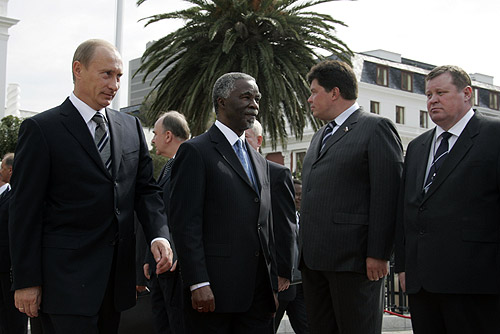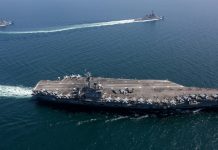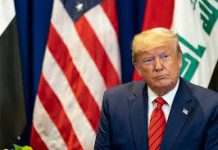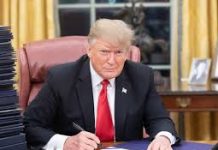
In a development that has caught the attention of political observers worldwide, Vladimir Putin and Volodymyr Zelensky, two prominent figures in the ongoing Ukraine crisis, have each consented to engage in separate discussions with a delegation comprising esteemed African heads of state. This crucial move, reported by none other than South Africa’s President Cyril Ramaphosa, aims to explore potential avenues for bringing an end to the devastating conflict that has plagued Ukraine.
According to a spokesperson from President Ramaphosa’s office, he engaged in telephone conversations with both his Russian and Ukrainian counterparts over the weekend, during which they reached a mutual understanding. Consequently, it was agreed that Moscow and Kyiv would host distinctive peace missions for the delegation of African leaders.
President Ramaphosa further disclosed that leaders from Zambia, Senegal, Congo, Uganda, and Egypt are set to accompany him on this vital peace-seeking mission. He emphasized that both Mr. Putin and Mr. Zelensky have granted their approval, thus authorizing him to commence the necessary preparations for these momentous meetings.
As of now, no concrete details have been provided regarding the specific agenda or parameters of these talks. Notably, Mr. Zelensky has previously expressed his unwavering stance, asserting that he will only consider a peace accord to conclude the protracted 15-month war once Russian forces have completely withdrawn from Ukrainian territory.
The United Nations Secretary-General, Antonio Guterres, has been apprised of the planned meetings with the African delegation, and President Ramaphosa expressed that Mr. Guterres has warmly welcomed this initiative. The involvement of prominent African leaders in this diplomatic endeavor underscores its potential significance and the hope it has kindled globally.
Analyzing the participating leaders in the forthcoming discussions, it is intriguing to note the differing leanings among them. Zambia and Congo, for instance, are inclined toward supporting the West, indicating a potential alignment with the interests of Western powers. On the other hand, Senegal and Uganda tend to display a more pro-Russia orientation, suggesting a certain affinity towards Moscow’s perspectives. Meanwhile, Egypt has positioned itself diplomatically, seeking a balanced approach in addressing the complexities of the conflict.
As the world watches with bated breath, the rendezvous between Putin, Zelensky, and the African heads of state promises to be an integral milestone in the pursuit of peace in Ukraine. The global community hopes that these upcoming discussions will yield constructive outcomes, potentially heralding a new chapter of stability and resolution in this protracted and devastating conflict.
“I agreed with both President Putin and President Zelensky to commence with preparations for engagements with the African heads of state,” said the South African leader while speaking at a press conference in Cape Town during a state visit by Singapore Prime Minister Lee Hsien Loong.
“We’re hoping we will have intensive discussions.”
With a sense of urgency and concern, President Cyril Ramaphosa refrained from providing explicit timelines or intricate specifics as he shed light on an impending visit. Acknowledging the catastrophic repercussions of the conflict, he underscored the profound devastation inflicted upon Africa, a continent that has also borne the brunt of its tragic consequences.
The reverberations of the war have reverberated across African nations, wreaking havoc on their economies. Soaring grain prices and the disruptive effects on global trade have dealt severe blows to the African countries, exacerbating their already challenging circumstances.
President Ramaphosa revealed that African leaders have been actively engaged in ongoing discussions and consultations over the past months. Their shared objective has been to discern viable pathways through which the continent can contribute to bringing an end to this protracted conflict. Driven by a collective determination, they have sought ways to facilitate resolutions and alleviate the suffering that has plagued the region for far too long.
“’This we have been talking about as African leaders, because we concluded that conflict in that part of the world, that much as it does not affect Africa directly in the form of deaths and destruction to our infrastructure, it does have an impact on the lives of many Africans with regards to food security. Prices of fertiliser, cereals and fuel have gone up,” he said.
“Facilitated by the Brazzaville Foundation, we have been able to have these discussions, and principal to our discussions are efforts towards a peaceful resolution to the devastating conflict in the Ukraine, its cost in human lives and the impact on the African continent.”
In February of the previous year, Russia initiated an invasion of Ukraine, sparking a conflict that has since reached a stalemate. However, recent developments indicate that Ukraine is poised to launch a counteroffensive in an attempt to reclaim the occupied territories and push back the forces under Putin’s command, situated in the eastern regions.
South Africa, regarded as one of Moscow’s closest allies in Africa, asserts its impartiality in the face of this conflict. The nation has refrained from taking sides and abstained from voting on United Nations resolutions pertaining to the war. President Ramaphosa announced this decision just a day after acknowledging the immense pressure South Africa has faced to align itself with one side or the other in this conflict.
These decisions came about as a response to accusations from the United States, which alleged that Pretoria had supplied weaponry to Moscow. Such an action would contradict South Africa’s professed stance of neutrality.
The forthcoming peace mission, spearheaded by African leaders, represents the latest endeavor in a series of diplomatic efforts aimed at resolving the war. Additionally, a Chinese special envoy is scheduled to arrive in Kyiv for a two-day visit with the purpose of promoting peace negotiations led by Beijing.
In a recent interview with a Spanish newspaper, UN Secretary-General Guterres expressed the belief that peace negotiations are currently unattainable, with both sides steadfast in their conviction of victory. Nonetheless, President Ramaphosa indicated that the African initiative has garnered cautious support from Washington and several European capitals that have been visited by facilitators tasked with presenting the peace plan.
This initiative has the potential to restore South Africa’s reputation as a neutral actor and mediator, countering accusations of leaning towards Russia. A noteworthy incident highlighting this shift was the presence of South Africa’s ground forces commander in Moscow to discuss military cooperation, adding to the examples cited by critics as evidence of a pro-Kremlin tilt.
Furthermore, last week, the US envoy to Pretoria raised concerns that a Russian freighter, which docked at a Cape Town naval base in December, had been loaded with weapons and ammunition. In response, South Africa’s Defense Minister, Thandi Modise, vehemently denied these allegations in an interview with the local newspaper, the Mail & Guardian.
“Everybody now sees the spook called South Africa. I can tell you that categorically, we did not send fokol, not even a piece of Chappies to Russia,” she said referring to a local popular bubble-gum brand and using an Afrikaans expletive meaning “nothing at all”.
“South Africa would not be drawn ‘into a contest between global powers’ despite having faced ‘extraordinary pressure’ to do so”, said Ramaphosa.
South Africa has opted not to denounce the conflict in Ukraine, a decision that has resulted in Moscow’s increasing isolation on the global platform. The South African government has expressed its intention to maintain a neutral position, refraining from overtly criticizing any party involved.
However, on Tuesday, Singapore’s Lee indirectly criticized South Africa’s stance, emphasizing that condemning Russia’s invasion was a matter of upholding fundamental principles. Speaking at a press conference held in Cape Town alongside President Ramaphosa, Lee asserted that a country cannot invade another with impunity and stressed the need to clearly express disapproval.
Lee emphasized that while Singapore maintains its friendship with Russia, it cannot endorse the actions that have transpired in the conflict.




